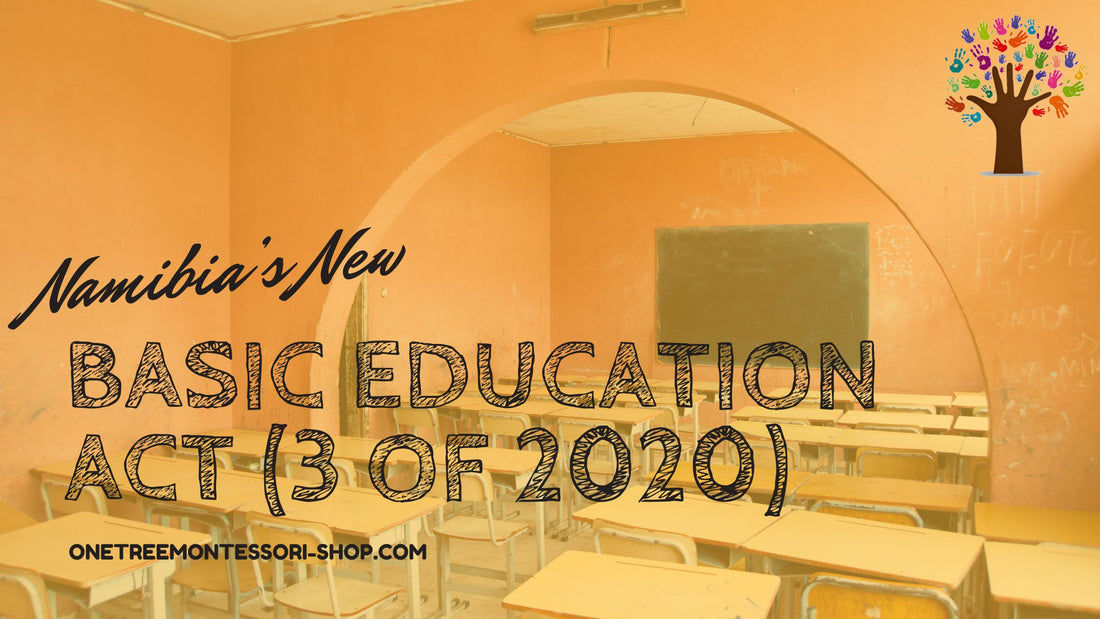
Namibia's Basic Education Act, 2020
Share
A New Law With A Lot of Additions and Few Updates
Disclaimer: This article was written by a person with no legal qualifications and represents their own interpretation. It does not constitute legal advice in any way - no liability by the author or One Tree Montessori will be entertained for actions taken on the basis of this post. It is the reader's responsibility to ensure compliance with all relevant laws in their area.
On 29 June 2020, the Government of Namibia gazetted a new law: the Basic Education Act (No. 3 of 2020).
Read it here ↗︎ (PDF link from the Legal Assistance Centre).
An Overview
The new Basic Education Act repeals and therefore replaces the previous Education Act (No. 16 of 2001) upon its commencement.
The Minister of Education is responsible for publishing the date of commencement in the Government Gazette. (The Circular Form ED: 10/2023 announced on 20 September 2023 that the Act will commence on 3 October 2023. Section 14: Integrated Early Childhood Development will be deferred until the Ministry pronounces itself on it.)
The new Act is more than double the length of the old one, sporting 98 pages instead of just 45. It's still nothing compared to the Child Care and Protection Act (No. 3 of 2015) with its 252 pages. But the Basic Education Act's scope, at first glance, does seem to be a lot more detailed than the old Acts.
A New Focus
Purpose of the Basic Education Act, 2020
To
- promote and regulate free and compulsory basic education;
- to ensure equitable inclusive quality education and lifelong learning;
- to promote and protect the right of learners to education;
- to provide for the establishment, accreditation, registration, governance and management of State and private schools and hostels;
- to provide for the establishment of the National Advisory Council on Education, the regional education forums, the National Examination, Assessment and Certification Board, the Teaching Service and the Education Development Fund;
- and to provide for incidental matters.
Purpose of the old Education Act, 2001
To
- provide for the provision of accessible, equitable, qualitative and democratic national education service;
- to provide for the establishment of theNational Advisory Council on Education, National Examination Assessment and Certification Board, Regional Education Forums, School Boards, Education Development Fund; to provide for the establishment of schools and hostels;
- to provide for the establishment of the Teaching Service and the Teaching Service Committee;
- and to provide for incidental matters.
As you can see, the focus of the new Act clearly is more detailed and aimed at improving education.
Basic Education Act (2020): Chapter Overview

While the old, now repealed Education Act 16 of 2001 had only 15 parts, the new Basic Education Act 3 of 2020 has the following five chapters:
- Introductory Provisions (including definitions, applications and standards)
- Learners (3 Parts)
- a) General Provisions Applicable to Learners
- b) Learners at State Schools
- c) Lifelong Learning and Adult Education
- Schools (8 Parts)
- a) Schools in General
- b) State Schools and Hostels
- c) Professional Management of State Schools
- d) Governance of State Schools
- e) Funding of State Schools
- f) Private Schools and Hostels
- g) Educational Curricula and Qualifications
- h) Monitoring and Evaluation of Schools and Hostels
- Institutional Matters and Development Fund (5 Parts)
- a) National Advisory Council on Education
- b) Regional Education Forum and Regional Education Directorates
- c) National Examination, Assessment and Certification Board
- d) Teaching Service
- e) Education Development Fund
- 5. General Provisions
Important Aspects
As in the old Education Act (2001), the Basic Education Act of 2020 defines basic education as "the formal education which is provided from the level of pre-primary to the last grade of secondary education, and includes -
(a) special education; and
(b) education of any other nature which the Minister under subsection (2) declares to be basic education."
Some other definitions have been added, such as
- “early childhood development” - meaning the period from birth to eight years of age focusing on building the foundation of a child for lifelong learning and development through healthcare, nutrition, child and social protection, child welfare, early learning and stimulation of a child in a variety of settings such as homes, schools, health facilities and community-based centres in terms of section 14;
- “home schooling” - meaning educational instruction in which parents and care-givers or other privately appointed tutors or service providers teach a learner a legally approved academic curriculum at home instead of at a public or private school;
- “learner-centred education” - meaning a teaching and learning approach which focuses on addressing the specific needs and interests of the individual learner by shifting the focus of teaching and learning from the teacher to the learner.
All in all, Namibia's new Basic Education Act (2020) does seem determined to provide for better education. But does it hold up under close scrutiny?
We've explored three key sections in the new Act:
Early Childhood Development
The term Early Childhood Development has for the first time in Namibia been legally defined. It transcends mere education (as in learning) and includes health care, nutrition, protection and welfare to build a foundation for lifelong learning and development.
The definition acknowledges that this can be done in a variety of settings. Section 14 of the Act concerns Integrated Early Childhood Development.
Subsection 1
While the Act requires the Minister to develop a National Policy Framework (see Section 4 of the Act), it does not specify when this has to be done - I am eager to see how the Ministry will use the delay in commencing this section.
![Section 14 of the Namibia Basic Education Act, 3 of 2020 that reads: "Integrated early childhood development 14. (1) The Minister, in developing the national policy framework on basic education under section 4, must include a policy on integrated early childhood development which is aimed at - (a) recognising the importance of the first 1000 days of a child in terms of health and safety, protection, nutrition and stimulation; (b) promoting contact with early childhood development and child care centres to facilitate the smooth transition between community based early childhood care or early childhood development centres; (c) preparing children above the age of three years for primary education and to provide early childhood care and education for all children until they reach the age of eight years; and [The verb “to provide” should be “providing”.] (d) the provision of progressive access to universal pre-school education for all children in Namibia."](https://cdn.shopify.com/s/files/1/0269/4447/1142/files/Namibia_Basic_Education_Act_3_of_2020-Section_14-ECD_480x480.png?v=1695825925)
It is about time that the Namibian government wakes up to the importance of early childhood.The first 1000 days roughly translate to three years. Dr Maria Montessori realised the importance of infancy at the beginning of the 20th century already.
When this National Policy Framework is done (I'd love to get my five cents in!), it looks like Early Childhood - which has so far been under the auspices of the Ministry of Gender Equality - will move more and more to the Ministry of Education, Arts and Culture.
This move has been in planning for a few years already; it's high time that the two Ministries ramp up their communication and start aligning efforts.
However, the mention of "universal" pre-school education for all children seems ominous. Besides the fact that private schools are still allowed to have their own, approved curricula, the Ministry as it currently stands doesn't have the manpower or budgeting skills to enforce the high standards we'd need.
Subsection 3-4
Subsection 3 enables the Minister ofEducation to "prescribe national norms and standards... that early childhood development programmes must comply with.

"The Child Care and Protection Act 3 of2015 has a similar paragraph: Section 71 prescribes minimum standards for all settings caring for children (not just ECDs). Subsection 4 allows the Minister (of Gender) to prescribe additional standards (considering the surrounding community).
Since the existing ECD standards cover basic hygiene aspects, we can only hope that the Ministry of Education now writes up high-quality educational standards that complement existing ones instead of reinventing the wheel.
The lack of inter-ministerial cooperation is made evident once again in subsection 4 of the Basic Education Act 3 of 2020, Section 14: The Minister may now prescribe requirements for registration of early childhood development services (defined in subsection 5).
ECDs are already required (well, encouraged) to register with the Ministry of Gender - see Section 74 of the Child Care and Protection Act 3 of 2015. Will they now have to register with two ministries? The efficiency of this, albeit well-intentioned, remains to be seen.
I'm also curious about the proposed national curriculum for children up to four years of age.
Private Schools
Part 6 of Namibia's Basic Education Act 3 of 2020 deals with private schools. There are some interesting additions to this section (compared with the old Education Act of 2001). First and foremost, the law now allows fines (N$50,000 and/or 2 years' imprisonment) for persons running a private school that is not registered in terms of Section 76.
Also, all private schools (that are, have been, or were supposed to be, registered under Section 42 of the Education Act 16 of 2001) are required to re-register with the Ministry of Education within 24 months from the date of commencement (01 October 2023). So, anyone who fails to do so becomes liable for a fine.
Satellite Schools
Another first for Namibia: "satellite schools" are now legally defined. They are, "in relation to a private school, a branch of this registered private school that is physically at a distance from the original school area either in the same region or a different region, under the same registration and at times under the same name."
Here's the catch: according to Section 75, "(4) A person may not open and operate a satellite school that is linked to a registered private school." That means, as far as I can tell, that new branches of registered schools should be registered independently.
Homeschooling
Homeschooling got updated in the new Act. The old Act (2001) already required homeschooling learners to be registered with the Ministry of Education (Section 52).
Now, the term is defined as "educational instruction in which parents and care-givers or other privately appointed tutors or service providers teach a learner a legally approved academic curriculum at home instead of at a public or private school."
Unlike some other countries, the Act does not provide for fines for parents who either fail to register their child for home schooling, or fail to ensure regular school attendance (although both are required).
Namibian Government Schools
Parts 2 to 5 of Chapter 3 (Schools) deal with state schools in particular. That's a total of 37 subsections - 30 more than the previous Act.
Some additions are
- that the Minister must ensure schools are accessible to people with physical disabilities (Section 38 (4));
- principles that govern state schools (Section 39);
- details about state schools on state or private property (Sections 40, 41);
- the legal status of a state school - it's not a juristic person (Section 42);
- support for underperforming schools (Section 44) and standards for infrastructure (Section 45)
There are now also Parts on Management and Governance, clearly laying out the roles and responsibilities of various staff. It stands to hope that all of these details help state schools attain, across the board, the standard they so desperately seek.
What Now?
Namibia's Basic Education Act (No. 3 of 2020) makes for some interesting reading. It now has provision for Early Childhood Development as well as school closures for health reasons (which may not exceed four months, by the way). State schools are a lot more clearly regulated.
With the commencement finally being announced, it remains to be seen what effect this new law really has.
